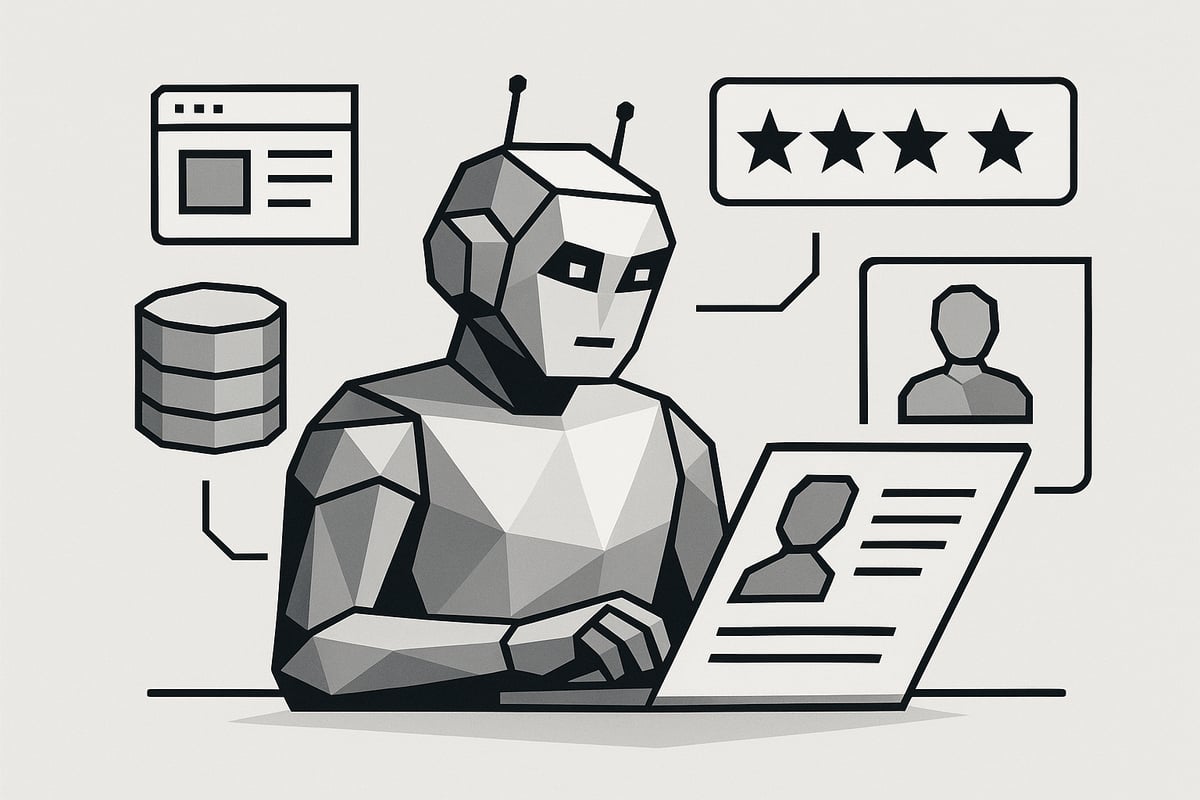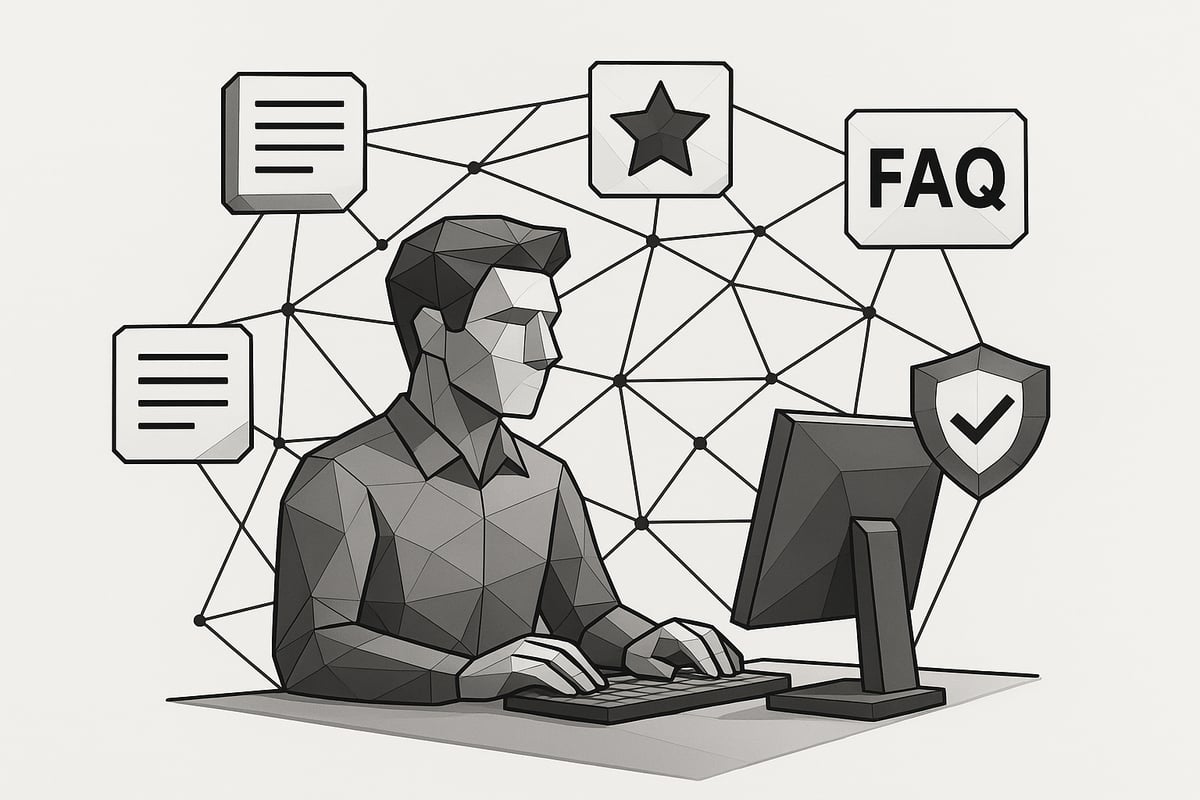In 2025, ChatGPT isn’t just answering questions—it’s shaping what people buy, trust, and recommend. AI assistants are now at the heart of online discovery, rapidly changing how brands gain visibility and influence.
For businesses and creators, the ability to get recommended by chatgpt is more than a competitive edge—it’s essential for online growth and credibility.
This guide is your step-by-step roadmap. You’ll learn how ChatGPT finds and chooses recommendations, what drives its decisions, and the proven strategies to boost your chances of being cited. We’ll break down ChatGPT’s inner workings, the importance of authority, key optimization moves, common mistakes, and how to future-proof your digital presence for the AI era.
Understanding How ChatGPT Recommends Content in 2025
In 2025, understanding how to get recommended by ChatGPT is essential for online visibility. ChatGPT’s recommendation engine draws on a diverse range of data sources, including its pre-2025 model training data, real-time web browsing for premium users, structured business databases, and highly authoritative sites. These sources help ChatGPT form a comprehensive picture of businesses, products, and services.
Unlike traditional search engines, ChatGPT does not simply pull up a list of links. Instead, it synthesizes information to provide direct, curated answers. The shift from real-time search to AI model-based recommendations means that strategies to get recommended by ChatGPT now extend beyond classic SEO. Brands must ensure their digital presence is clear, authoritative, and consistent across all platforms.
ChatGPT fields a wide variety of recommendation queries every day. Users rely on it for suggestions about products, local services, professional resources, and even expert opinions. To get recommended by ChatGPT, your business must consistently demonstrate trust signals. These include up-to-date information, domain authority, recent content updates, and strong external validation from reviews and third-party platforms.
The way ChatGPT weighs these trust signals is methodical. For example, when a user asks for the best local web agency, ChatGPT cross-references Google Business Profile data, online reviews, and evidence of niche expertise. Only businesses presenting a unified, reputable digital footprint are likely to get recommended by ChatGPT. According to recent surveys, over 40 percent of consumers now consult AI assistants before making purchase decisions. This trend highlights the impact of AI on buying behavior.
If your digital presence is weak, inconsistent, or lacks credible references, your chances to get recommended by ChatGPT are slim. The rise of answer engines has broadened the scope of SEO, requiring ongoing optimization for AI platforms. For a comprehensive breakdown of strategies, How SEO Impacts ChatGPT Recommendations offers valuable insights into this evolving landscape.
To succeed, businesses must adapt their strategies and maintain a robust, trustworthy presence across all digital touchpoints. The brands that invest in authority, transparency, and external validation are best positioned to get recommended by ChatGPT in the new era of AI-driven discovery.

Building Authoritative, AI-Friendly Content
Authoritative content is the backbone of your digital strategy if you want to get recommended by chatgpt. In 2025, AI assistants like ChatGPT are not just scanning for keywords, they are evaluating expertise, trustworthiness, and user value. If your content stands out as credible and comprehensive, you dramatically increase your chances of being cited by AI models.

Why Authoritative Content Matters
To get recommended by chatgpt, your website must demonstrate clear expertise and reliability. AI models are trained on vast amounts of web data, but they prioritize sources that consistently provide accurate, in-depth answers. This means thin, generic pages are less likely to be surfaced.
Authoritative content signals to ChatGPT that your site is a trusted resource, similar to how top-ranking Google results are chosen. If your articles are referenced by other reputable sites or cited in industry discussions, AI notices that credibility.
What Content ChatGPT Prefers in 2025
ChatGPT favors content that is clear, thorough, and genuinely helpful. Pages should answer the actual questions your audience asks. Comprehensive FAQs, real-world comparisons, and detailed guides all help you get recommended by chatgpt.
Consider this table highlighting preferred content types:
| Content Type | Why AI Prefers It | Example |
|---|---|---|
| Detailed FAQs | Direct answers, clarity | “Web Design Pricing FAQ 2025” |
| Comparison Guides | User-centric, transparent | “Best CRMs for Small Teams” |
| Honest Reviews | Builds trust, authenticity | “Our SEO Process: Pros & Cons” |
ChatGPT also values content written in plain language, with clear headers and logical flow.
Building Trust Through Transparency
Transparency is crucial if you aim to get recommended by chatgpt. This means clearly stating your pricing, outlining your service process, and openly addressing both pros and cons. When your content is straightforward and honest, it mirrors the trust signals AI models are trained to recognize.
Update your pages regularly to reflect changes in your industry. Referenced and refreshed content signals recency, which is a significant factor for AI recommendations.
Actionable Strategies to get recommended by chatgpt
To maximize your visibility, focus on strategies proven to help you get recommended by chatgpt. Start by publishing content that answers specific buyer questions. Use comparison tables, process breakdowns, and transparent pricing pages to address user needs.
Incorporate structured data and ensure your site is easy for both humans and AI to navigate. For a deeper dive into these tactics, explore Optimizing Content for AI Search, which provides practical steps for making your content AI-friendly.
Remember, consistency and authority across your site and external platforms will help you stand out as a trusted recommendation source for ChatGPT in 2025.
Essential Steps to Get Recommended by ChatGPT in 2025
To get recommended by ChatGPT in 2025, you need a proactive, multi-layered strategy. The landscape has changed, and now, every detail of your digital presence matters. Below, you’ll find a step-by-step guide designed to help you maximize your visibility and authority—ensuring ChatGPT recognizes and recommends your business.

Step 1: Claim and Optimize Your Google Business Profile
Your Google Business Profile is often the first data source ChatGPT references for local recommendations. To get recommended by ChatGPT, ensure your profile is complete and accurate.
- Fill in every section: business name, address, hours, and service areas.
- Upload high-quality photos and update them regularly.
- Add detailed categories and services.
- Encourage customers to leave honest reviews, and respond promptly to feedback.
Businesses with robust, up-to-date profiles are far more likely to get recommended by ChatGPT for local queries. In fact, 90 percent of ChatGPT’s local suggestions in 2025 reference Google Business data. Consistency and detail here set the foundation for AI-driven visibility.
Step 2: Publish Buyer-Focused, Trustworthy Content
Content remains king, but in 2025, it must directly address real buyer needs. To get recommended by ChatGPT, your website should answer the questions your audience is asking.
- Identify common buyer questions and create dedicated pages for each.
- Use clear titles and concise summaries.
- Include transparent information: pricing, process, and honest pros and cons.
A standout example is a guide like “How Much Does Web Design Cost in 2025?”—transparent, actionable, and authoritative. For a deeper dive into content tailored for AI models, see AI-Driven Content Creation Strategies. The clearer and more trustworthy your content, the higher the likelihood you’ll get recommended by ChatGPT.
Step 3: Ensure Consistency Across All Platforms
Inconsistencies in your business name, address, or messaging can confuse AI and reduce your chances to get recommended by ChatGPT. Audit your presence everywhere your brand appears.
- Check business directories, social profiles, and review sites.
- Standardize your descriptions and service offerings.
- Use a checklist to regularly verify and update information.
Uniformity across platforms signals to ChatGPT that your business is legitimate and reliable. Even small discrepancies can hurt your visibility, so review your digital footprint routinely to get recommended by ChatGPT.
Step 4: Build and Manage Reviews & Citations
External validation is crucial if you want to get recommended by ChatGPT. Proactively seek reviews from satisfied customers and aim for mentions in industry directories and roundups.
- Request reviews on Google, Yelp, G2, and Trustpilot.
- Respond to all feedback, both positive and negative.
- Monitor new citations and correct any errors promptly.
Businesses with a steady flow of genuine, high-quality reviews are more likely to get recommended by ChatGPT. External trust signals are among the top ranking factors for AI-driven recommendations, so never underestimate their power.
Step 5: Create Clear, Structured Topic Pages
Dedicated, well-structured pages for your core offerings help you get recommended by ChatGPT. Use internal links, schema markup, and easy-to-read layouts.
- Build pages for each service, product, or area of expertise.
- Add FAQs, clear headers, and regular updates to signal freshness.
- Connect related topics within your site to guide both users and AI.
An example is an “Our SEO Process” page that breaks down your approach step-by-step, includes frequently asked questions, and uses schema for clarity. Structured, focused pages make it much easier to get recommended by ChatGPT and stand out in a crowded digital world.
Common Pitfalls and Misconceptions to Avoid
Trying to get recommended by chatgpt in 2025 is not about quick tricks or shortcuts. Many businesses fall into the trap of believing there are easy ways to game the system, but AI models have become far too advanced for that. Instead, genuine authority and trust are the foundation for every recommendation ChatGPT makes.
Myth vs. Reality: Getting Recommended by ChatGPT
| Myth | Reality |
|---|---|
| Keyword stuffing boosts your chances | AI models ignore low-quality, repetitive content |
| Fake reviews or citations help you get recommended by chatgpt | ChatGPT detects manipulation and penalizes dishonesty |
| Sponsored content or ads influence AI recommendations | Only organic, validated authority matters |
| One-off blog posts are enough | Consistency and depth are required for lasting visibility |
Many believe that if you simply stuff your website with keywords, you can get recommended by chatgpt more often. In reality, AI language models are designed to filter out repetitive or manipulative content. They look for real expertise, clear value, and external trust signals.
Common Mistakes That Hurt Your Visibility
- Using fake or purchased reviews to quickly boost your reputation
- Relying on a single blog post instead of a comprehensive content strategy
- Allowing inconsistent business information across platforms
- Neglecting to update your content or respond to customer feedback
- Focusing on paid ads while ignoring organic authority-building
Trying to get recommended by chatgpt through shortcuts like these not only fails, but can also damage your reputation in the long run.
The Importance of Trust and External Validation
Trust is the currency of AI recommendations. According to a global survey, over half of consumers now feel comfortable relying on AI assistants for daily decisions. ChatGPT relies on signals like consistent positive reviews, genuine citations, and clear, authoritative content to decide who gets recommended.
Manipulating these signals with fake data or inconsistent messaging is quickly detected. AI models cross-reference multiple sources and can spot patterns that indicate dishonesty or low quality.
Focus on Long-Term Value, Not Growth Hacks
Businesses that try to get recommended by chatgpt with one-off tactics or "growth hacks" rarely see sustainable results. AI models are constantly evolving to favor transparency, consistency, and real-world authority. The most successful brands are those that invest in building a trustworthy digital presence, respond openly to feedback, and continually update their content to address real buyer needs.
Instead of searching for a secret formula, focus on providing genuine value and clarity in every aspect of your online presence. This is the only reliable way to get recommended by chatgpt and stay ahead as AI-driven discovery becomes the new standard.
Future-Proofing Your Visibility in the Age of AI Recommendations
The digital landscape is transforming at breakneck speed. In 2025, AI-powered chat assistants like ChatGPT are not just alternative tools—they are becoming the primary way people discover new brands, products, and services. If your goal is to get recommended by chatgpt, you need to reimagine your visibility strategy from the ground up.
The move from traditional search engines to AI-driven “answer engines” is already impacting how consumers engage online. In fact, Gartner's AI Assistant Forecast predicts mobile app usage will drop 25 percent by 2027 as users increasingly rely on AI assistants for discovery and decision-making. This seismic shift means you cannot afford to rely solely on standard SEO or social media—your brand must be ready to get recommended by chatgpt in every digital channel.
To future-proof your visibility, start by diversifying your online presence. Maintain a robust, up-to-date website, but also ensure your business is present on social platforms, reputable directories, and emerging AI-specific platforms. Each touchpoint is a new opportunity to get recommended by chatgpt as consumer habits evolve.
Here is a quick comparison of discovery channels:
| Discovery Channel | 2023 Share of Discovery | 2025 (Projected) | AI Assistant Influence |
|---|---|---|---|
| Traditional Search | 65% | 40% | Medium |
| Social Media | 20% | 15% | Low |
| AI Assistants | 10% | 30% | High |
| Directories/Reviews | 5% | 15% | High |
This table highlights why you must optimize for AI assistants if you want to get recommended by chatgpt and stay ahead of the curve.
Updating and expanding your content regularly is essential. Monitor trending buyer questions, industry shifts, and AI search behaviors. Use these insights to create new guides, FAQs, and resources. Brands that adapt early to AI-driven discovery—by answering real, current questions—see sustained organic growth and a higher chance to get recommended by chatgpt.
Additionally, reputation management is more critical than ever. Monitor your reviews and structured data across all platforms. Tools that alert you to inconsistencies or negative feedback can help you address issues before they impact your AI visibility. According to AI's Impact on Holiday Sales, AI-powered chatbots drove significant increases in online sales during the 2024 holiday season, proving that brands with strong AI-friendly reputations benefit the most.
Ultimately, to thrive in this new era, act like an “answer engine” yourself. Be clear, authoritative, and always helpful. If you want to consistently get recommended by chatgpt, focus on being the trusted resource that both users and AI models turn to for reliable answers.
If you’re ready to take your business’s online visibility to the next level and ensure you’re on ChatGPT’s radar in 2025, now is the perfect time to act. With the digital landscape shifting towards AI-powered recommendations, building trust and authority is more important than ever. RankPill gives you the tools to automate high quality SEO content, manage reviews, and keep your information consistent—so you can focus on what matters most: growing your business. Let’s put your brand in the spotlight where AI assistants and real customers can find you.
Get Started